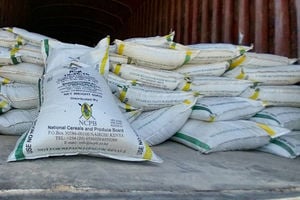Inflation jitters ahead of CBK interest rate decision

The Central Bank of Kenya headquarters in Nairobi.
What you need to know:
- CBK figures show that core inflation edged up to 3.6 per cent in January 2024 from 3.4 per cent in December, a three-month high rate.
- The re-emergence of pressure on non-food and non-fuel prices has coincided with the rebound in overall inflation or headline inflation which hit 6.9 per cent last month from 6.6 per cent in December.
- The uptick in core inflation mirrors higher prices for general goods and services
An increase in core inflation--the change in the cost of goods and services excluding those from the food and energy sectors—has triggered fresh concerns of pressure on interest rates ahead of tomorrow when the monetary policy team of the Central Bank of Kenya (CBK) sets its new indicative lending rate.
The banking regulator’s figures show that core inflation edged up to 3.6 per cent in January 2024 from 3.4 per cent in December, a three-month high rate.
The re-emergence of pressure on non-food and non-fuel prices has coincided with the rebound in overall inflation or headline inflation which hit 6.9 per cent last month from 6.6 per cent in December.
The uptick in core inflation mirrors higher prices for general goods and services excluding food and fuel prices whose prices are usually considered volatile despite their largely fixed demand.
This will be a matter of concern for CBK at its policy meeting tomorrow, with the apex bank favouring the non-food/non-fuel gauge to monitor consumer prices and inform its policy stance.
Globally, monetary policy is seen as more responsive to core inflation by major central banks—a factor that could shape the decision of the CBK policy team.
The central bank on December 5, 2023, made a jumbo raise on its indicative lending rate to 12.50 per cent from 10.50 per cent.
Core inflation has, however, declined significantly from a previous multi-year high of 4.45 per cent in February 2023.
Last month, the International Monetary Fund (IMF) warned of building near-term inflationary pressures from a combination of volatility in global oil prices and pass-through effects of a weaker exchange rate.
The multi-lateral lender foresaw inflation remaining contained by CBK’s previous benchmark lending rate increase from 10.5 to 12.5 per cent on December 5, which was mainly aimed at addressing the impact of a weaker exchange rate to consumer prices.
“Inflation is expected to inch up in the first half of 2024, driven primarily by global oil price volatility and exchange rate passthrough, but to remain contained due to the recent monetary policy tightening,” the IMF indicated.
Headline inflation also raced to a three-month high last month as consumers saw higher costs for foodstuffs, school fees, electricity, clothing, and financing.
The rise in consumer prices coincided with the reopening of schools in the 2024 academic calendar which put pressure on household budgets as parents paid school fees and bought education materials including uniforms and footwear.





